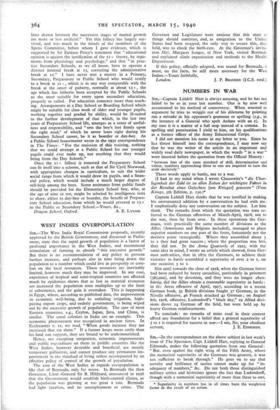NUMBERS IN WAR
Sia,—Captain Liddell Hart is always amusing, and he has not failed to be so in your last number. One is by now well accustomed to his method of controversy. When worsted in argument he tries to wriggle out of his dilemma by pointing out a mistake in his opponent's grammar or spelling (e.g., in the instance of a General who spelt Ardant with an e). In my case it is a matter of a full stop instead of a comma. In spelling and punctuation I yield to him, on his qualifications as a former officer of the Army Educational Corps.
I did not mention his name in my letter to you. Since he hr.s thrust himself into the correspondence, I may now say that he was the writer of the article in an important and widely read daily newspaper, in which the words " in a war " were inserted before the quotation from the Official History: " between foes of the same standard of skill, determination and valour, numbers approaching three to one are required to turn the scale decisively."
These words apply to battle, not to a war.
(I had in my mind when I wrote Clausewitz's "die Uber- legenheit der Zahl 1st zu alien Zeiten der wichtigste Faktor in der Resultat eines Gefechtes [not Krieges] gewesen" (Vom Kriege, 5th Edition, p. 150.)* Captain Liddell Hart thinks that he was justified in making his unwarranted addition by a conversation he had with me. I emphatically deny any conversation on the subject. Let him think. The remarks from which the quotation was torn re- ferred to the German offensives of March-April, 1918, not to the war, then far from over. In these operations the Ger- mans, with practically the same number of divisions as the Allies (Americans and Belgians included), managed to place superior numbers on one part of the front, fortunately not the decisive point strategically. Where they assembled about 3 tot they had great success ; where the proportion was less, they did not. In the Army Quarterly of 1922, with the same idea in mind, I wrote an article which showed, from Ger- man authorities, that in 1870 the Germans, to achieve their victories in battle assembled a superiority of over 2 to I, on one occasion 5 to I.
Not until towards the close of 1918, when the German forces had been reduced by heavy casualties, particularly in prisoners (385,000), and by desertion, and they were no longer eben- biirtig, did the Allies obtain a reasonable superiority in battle: in the Arras offensive of April, 1917, according to a recent German book, 35 British divisions fought 37 German; in the Nivelle offensive, 46 French attacked 42 German ; on August 8th, 1918, offensive, Ludendorff's " black day," 19 Allied divi- sions drove 14 German off the field, but were held up by heavy German reinforcements.
To conclude : no remarks of mine read in their context afford any foundation for a belief that a general superiority of 3 tot is required for success in war.—I am, Sir, your obedient






















































 Previous page
Previous page